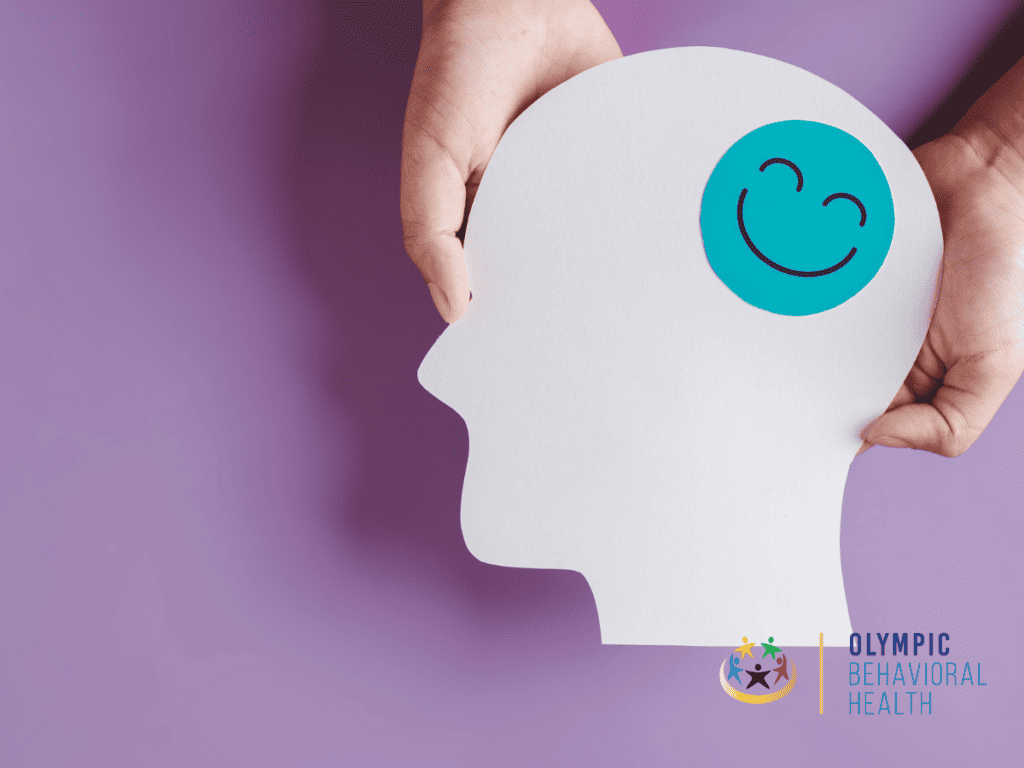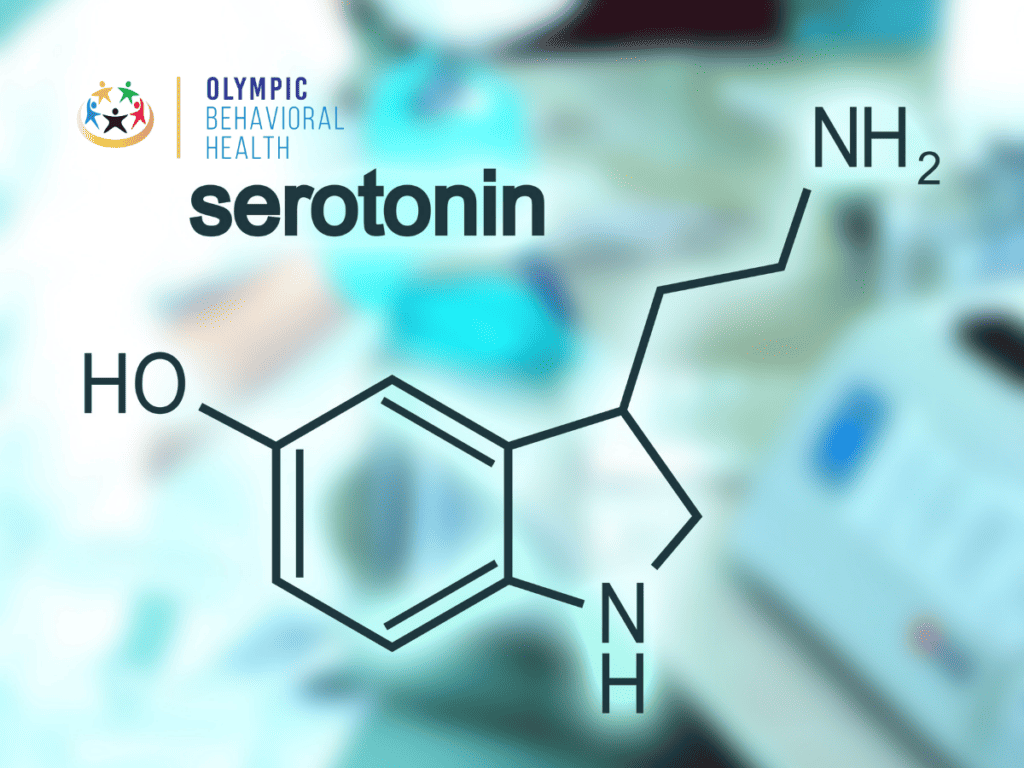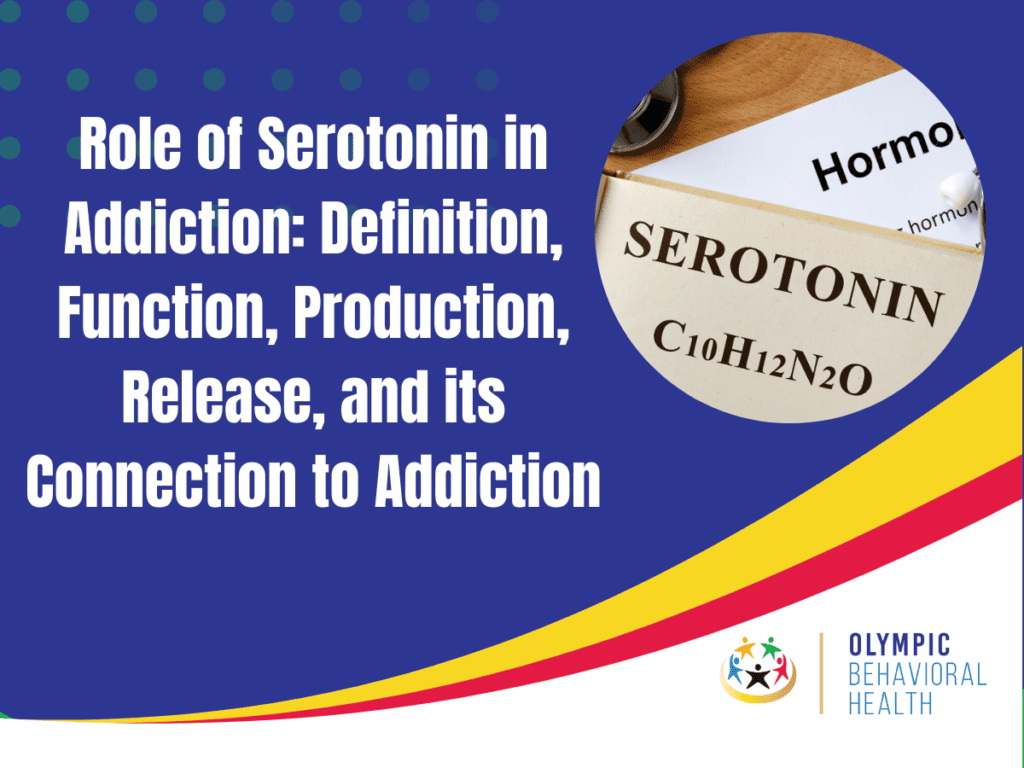Serotonin is a neurotransmitter primarily found in the brain, blood platelets, and intestines. It plays a crucial role in regulating various physiological processes, including mood, sleep, appetite, digestion, memory, and sexual desire.
In the brain, serotonin is primarily produced in specialized neurons located in the brainstem. It is also produced in the mucosa of the stomach and intestines, and small amounts are synthesized in platelets and certain immune cells.
Serotonin is stored within vesicles in the presynaptic terminals of neurons and is released when an electric signal travels down the neuron. After its release, it is reabsorbed or broken down and eliminated from the body.
Serotonin is linked to substance abuse as imbalances in serotonin levels increase susceptibility to substance addiction. Addiction leads to further changes in serotonin levels, thereby reinforcing the cycle of addiction.

What is Serotonin?
Serotonin is a neurotransmitter, which means it’s a chemical messenger in the brain and body that helps to transmit signals between nerve cells (neurons). It is primarily found in the brain, intestines, and blood platelets. Serotonin plays a crucial role in regulating various physiological processes, including mood, sleep, appetite, digestion, memory, and sexual desire.
In the brain, serotonin is involved in regulating mood, anxiety, and happiness. It is often referred to as the “feel-good” neurotransmitter because higher levels of serotonin are associated with feelings of well-being and happiness, while lower levels are linked to anxiety, depression, and mood disorders.
It also plays peripheral roles in the gastrointestinal tract, where it helps regulate bowel movement, and blood platelets, where it plays a role in blood clotting and wound healing.
Imbalances in serotonin levels or functioning have been implicated in various psychiatric and neurological disorders, including depression, anxiety disorders, obsessive-compulsive disorder (OCD), bipolar disorder, and schizophrenia. Consequently, medications that target serotonin receptors are commonly used to treat these conditions.
What is the Function of Serotonin?
Serotonin serves numerous essential functions in the body. Here are a few of the essential roles this hormone plays in the body.
Mood Regulation
Serotonin is often referred to as the “feel-good” neurotransmitter because it plays a critical role in regulating mood. Normal serotonin levels are linked to increased focus, emotional stability, feelings of well-being, and happiness. Low levels of the hormone are linked to depression and anxiety. Medications used for these conditions are meant to induce the level of serotonin secretion in the body.
Sleep Regulation
Serotonin helps regulate sleep-wake cycles. Together with dopamine, this hormone affects the quality and length of sleep. Serotonin is also involved in the production of melatonin, a hormone that regulates sleep patterns and circadian rhythms.
Appetite and Digestion
According to a study by Terry N. And Margolis K.G. titled ‘Serotonergic Mechanisms Regulating the GI Tract: Experimental Evidence and Therapeutic Relevance’ about 95 percent of serotonin production is in the gastrointestinal tract. Here the hormone regulates appetite, digestion, and bowel movements. It influences feelings of hunger and satiety, as well as intestinal motility. Serotonin imbalance can lead to digestive problems such as irritable bowel syndrome (IBS).
Cognition and Memory
Serotonin is involved in cognitive functions such as learning and memory. It modulates neuronal activity in brain regions associated with cognitive processes, including the prefrontal cortex and hippocampus.
Blood Clotting and Wound Healing
In blood platelets, serotonin is involved in blood clotting and wound healing. It regulates platelet aggregation and causes arterioles to narrow, thereby facilitating clotting, aiding wound healing, and preventing excessive bleeding.
Sexual Function
Serotonin, together with dopamine, plays a role in sexual desire and function. It can influence libido, arousal, and sexual behavior.
Pain Sensation
Serotonin contributes to the modulation of pain sensation. It affects the transmission of pain signals in the spinal cord and brain, influencing the perception of pain.

How is Serotonin Produced?
Serotonin is synthesized through a multistep process in both the neurons and certain cells of the gastrointestinal tract from tryptophan, its precursor.
Tryptophan is an essential amino acid obtained from dietary sources. It is transported through the bloodstream, across the blood-brain barrier into the brain, where it is utilized in serotonin production. Here are the steps to producing serotonin:
- Tryptophan Hydroxylation: Tryptophan is transported to neurons in the brain. Within these neurons, tryptophan is converted into 5-hydroxytryptophan (5-HTP) through the action of the enzyme tryptophan hydroxylase. This conversion is the rate-limiting step in serotonin synthesis.
- Decarboxylation: The enzyme aromatic L-amino acid decarboxylase (AADC) catalyzes the decarboxylation of 5-HTP to form serotonin, also known as 5-hydroxytryptamine (5-HT). This step occurs within the cytoplasm of neurons.
- Packaging into Vesicles: Serotonin synthesized within neurons is packaged into synaptic vesicles, small membrane-bound sacs located in the presynaptic terminals of neurons. These vesicles serve as storage sites for neurotransmitters.
How Do You Boost Serotonin Production?
A great way to boost serotonin production is by consuming foods rich in tryptophan. According to Jenkins T, et al., in their 2016 study ‘Influence of Tryptophan and Serotonin on Mood and Cognition with a Possible Role of the Gut-Brain Axis,’ eating tryptophan-deficient foods leads to a reduction in serotonin levels.
Here are some foods that are rich in tryptophan:
- Meat
- Egg
- Milk
- Oat
- Soy
- Yogurt
- Cheese
Other ways to boost serotonin production include the following:
- Supplements
- Exercise
- Sunshine
- Gut Bacteria
Serotonin Release
Several activities, such as physical exercise, sexual activities, and exposure to bright light stimulate the release of serotonin. These activities cause the stimulation of the presynaptic neuron, and serotonin is released from the synaptic vesicles into the synaptic cleft. This process, known as neurotransmitter release, allows serotonin to exert its effects on postsynaptic receptors.
After serotonin has transmitted its signal, it is taken back up into the presynaptic neuron by serotonin transporters. This process, called reuptake, allows for the recycling of serotonin for future use.
How Does Serotonin Affect Substance Abuse?
Serotonin is one of the neurotransmitters that has a connection to substance abuse. Its involvement with substance addiction is complex and multifaceted. According to Fischer and Ullsperger in their 2017 study ‘Update on the Role of Serotonin and its Interplay with Dopamine for Reward’ here are a few connections between serotonin and addiction:
Regulation
Serotonin plays a key role in regulating mood and emotional states. Imbalances in serotonin neurotransmission, such as low serotonin levels contribute to mood disorders, increasing vulnerability to substance abuse because individuals turn to drugs and substance abuse to boost serotonin levels artificially. Substance abuse can exacerbate serotonin imbalances, creating a cycle of self-medication and further dysregulation of serotonin neurotransmission.
Cravings and Withdrawal Symptoms
Substance abuse is implicated as a cause of increased serotonin levels. This surge in serotonin levels leads to intense cravings. When substance abuse is halted without medical aid, serotonin levels decrease drastically, leading to withdrawal symptoms such as depression, anxiety, and irritability.
Impulse Control and Decision-Making
Serotonin influences the prefrontal cortex and other brain areas involved in impulse control and decision-making. Dysfunction in serotonin pathways will impair how these areas function, leading to impulsivity and poor decision-making, which are associated with an increased risk of substance abuse.
Drug Effects on Serotonin Receptors
Certain drugs, like MDMA, directly target serotonin receptors, altering serotonin levels and neurotransmission. This leads to short-term euphoric effects but also has the potential for long-term depletion of serotonin levels.
Co-occurring Disorders
Substance use disorders rarely occur alone. They often come with co-occurring mental health disorders such as anxiety and depression. Serotonin dysfunction is a symptom of most mental health disorders and implies a connection between substance abuse and mental health.
How Does Substance Abuse Affect Serotonin Levels?
Substance use disorders alter the natural balance of serotonin and significantly influences serotonin levels and actions in the brain. Here are a few effects substance abuse has on serotonin:
Decreased Production and Release
Long-term substance abuse is linked to decreased production and secretion of serotonin. This leads to symptoms such as depression, mood swings, and anxiety. Lower serotonin levels also contribute to the negative emotions experienced by people with substance use disorders.
Impaired Serotonin Uptake
The use of certain substances, such as ecstasy, hinders serotonin reuptake. This leads to an accumulation of the hormone in the neural synapses. At first, this accumulation leads to a sense of euphoria and a boost of positive moods. But in the long term. It leads to serotonin depletion and exacerbates the negative effects of substance addiction.
Desensitization of Serotonin Receptors
Substance use disorder leads to desensitized serotonin receptors, which alters sensitivity to serotonin. Altered sensitivity reduces response to serotonin, and induces tolerance development.
How does serotonin influence cravings and relapse in addiction?
Serotonin regulates cravings and mood, impacting the likelihood of relapse during addiction recovery. Imbalances in serotonin levels can intensify cravings, making relapse more challenging to overcome. Treatment strategies targeting serotonin pathways may help manage cravings and prevent relapse.
Can genetic factors influence serotonin’s role in addiction susceptibility?
Yes, genetic variations affecting serotonin neurotransmission can influence addiction risk. Polymorphisms in genes related to serotonin receptors or metabolism may impact an individual’s vulnerability to addiction. Understanding these genetic factors can inform personalized approaches to addiction treatment.
How does serotonin deficiency contribute to co-occurring mental health disorders and substance abuse?
Serotonin deficiency is linked to mood disorders like depression and anxiety, which commonly co-occur with substance abuse. Individuals with untreated mood disorders may self-medicate with drugs or alcohol to alleviate symptoms. Addressing serotonin imbalances through medication or therapy is crucial in managing co-occurring mental health issues and addiction.
What role does serotonin play in the development of tolerance and withdrawal symptoms in addiction?
Chronic drug use can lead to adaptations in serotonin receptors, contributing to tolerance development. Withdrawal from drugs can result in serotonin withdrawal symptoms, including mood disturbances and agitation. Managing withdrawal symptoms and supporting recovery may involve medications or therapies targeting serotonin pathways.
Are there lifestyle factors that can support healthy serotonin levels and reduce the risk of addiction?
Regular physical activity increases serotonin levels and mood, potentially lowering addiction risk. A balanced diet rich in tryptophan supports serotonin synthesis. Practices like mindfulness meditation and social support networks promote emotional well-being, reducing susceptibility to addiction.
Can other neurotransmitter also cause Addiction?
Yes, let’s have a look at some:
How is Endorphins related to Addiction?
Endorphins, also known as the body’s natural painkillers, are closely related to addiction as they can produce feelings of pleasure and euphoria similar to some addictive substances. Endorphins are naturally produced in response to stress, pain, and physical activity.
When an individual engages in addictive behaviors such as drug use or gambling, endorphins are released in the brain, producing a “high” or sense of reward. This reinforces the addictive behavior and can lead to dependency. Serotonin, on the other hand, plays a role in regulating mood and impulse control, and its deficiency has been linked to addiction.
Therefore, a balance between endorphins and serotonin is crucial in preventing addiction. For more information about the connection between endorphins and addiction, check out our article “The Role of Endorphins in Addiction“.
How is Dopamine related to Addiction?
Dopamine is also a neurotransmitter that plays a significant role in addiction. Like serotonin, it is involved in controlling pleasure, motivation, and reward pathways in the brain.
Specifically, dopamine is responsible for the feeling of pleasure and reward that is associated with drug use. When drugs are consumed, dopamine is released in large amounts, creating a sense of euphoria and reinforcing the behavior. Over time, the brain becomes adapted to this influx of dopamine and requires more of the drug to produce the same effect.
This leads to the cycle of addiction, where individuals feel the need to constantly seek out and use the drug to maintain the pleasurable effects. For more information on the effects of dopamine on addiction, check out the article “The Role of Dopamine in Addiction“.
Get help for your Addiction
Addiction Treatment at Olympic Behavioral Health offers help and support for those struggling with addiction. Taking the first step can be difficult, but it is crucial to call for assistance. Our facility in West Palm Beach provides comprehensive addiction treatment programs to guide individuals towards recovery. If you or your loved one is battling addiction, reach out to Olympic Behavioral Health today.
Olympic Behavioral Health Drug Rehab
Olympic Behavioral Health Drug Rehab is a place where healing begins. With compassionate professionals and a state-of-the-art facility in West Palm Beach, we understand that overcoming addiction is challenging. The first step is calling us, and we will provide the help and support you need on your journey to recovery.

Share This Post



